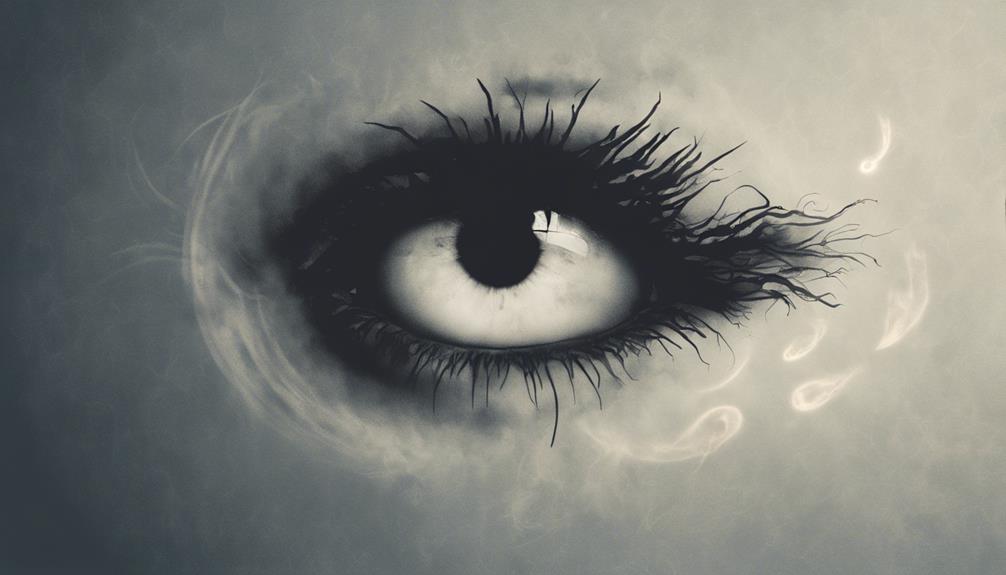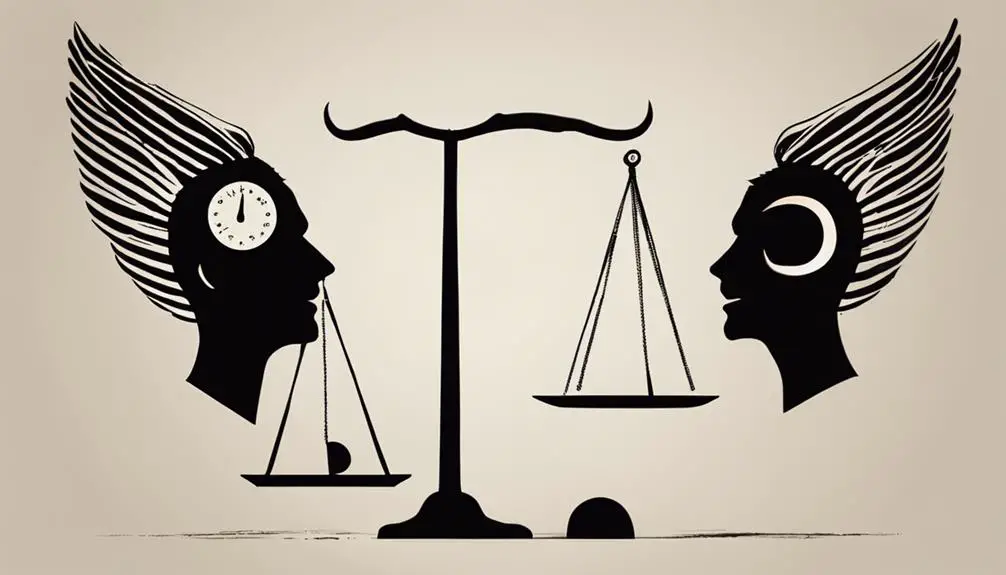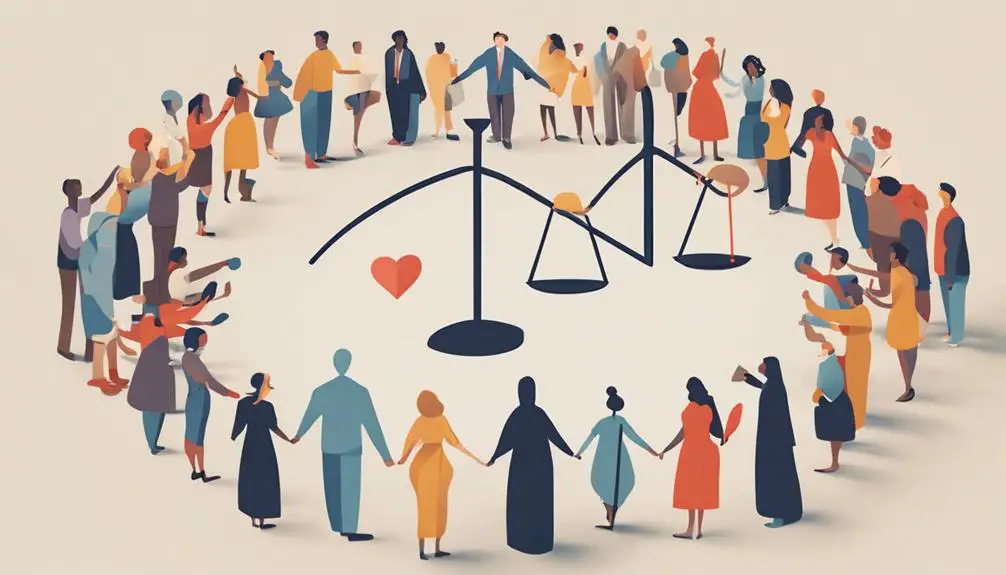Beyond a simple gesture, explore the moral and cultural implications of rolling your eyes and whether it's considered a sin in this insightful analysis.

Is Rolling Your Eyes a Sin?
Imagine you're in a heated debate with a friend over a trivial matter, and in a moment of frustration, you roll your eyes.
This seemingly innocuous gesture raises an intriguing question: Is rolling your eyes considered a sin? Various religious and ethical frameworks offer differing perspectives on the matter, often reflecting on the intent and cultural interpretation behind the action.
As you ponder the implications of this common behavior, consider how such a small act can carry significant moral and cultural weight. The answer might not only surprise you but also challenge you to rethink the nuances of everyday interactions.
Key Takeaways
- Eye-rolling may be considered disrespectful or arrogant in some religious traditions, reflecting poorly on one's character.
- The sinfulness of eye-rolling can depend on the intention behind the gesture and its interpretation within a faith community.
- Cultural and contextual nuances play a significant role in whether eye-rolling is viewed as sinful or merely a social signal.
- Understanding and respecting the varied interpretations of non-verbal cues like eye-rolling are essential in both religious and ethical considerations.
Understanding Eye-Rolling

To grasp the implications of eye-rolling, it's essential to explore its origins and how it functions as a non-verbal form of communication. This gesture, deeply ingrained in body language, often signifies a mix of disdain, sarcasm, or boredom. When you roll your eyes, you're not just moving your eyeballs; you're engaging in a form of expression that transcends verbal barriers. However, this act can lead to a communication breakdown, signaling disrespect or disinterest in the ongoing conversation.
Understanding the nuances of eye-rolling is crucial. It's not merely a spontaneous reaction but a learned behavior that varies across cultures and contexts. While you might perceive it as a harmless way to convey your feelings, the recipient might see it as a direct challenge or insult. This disparity in interpretation underscores the complexities of non-verbal cues in human interactions. Therefore, recognizing the potential for misunderstanding inherent in eye-rolling can help you navigate social situations more effectively, ensuring your non-verbal cues complement rather than contradict your intentions.
Religious Perspectives
Religious doctrines often interpret eye-rolling differently, reflecting diverse attitudes toward this gesture's moral and ethical implications. In your exploration of this topic, you'll find that body language, including eye-rolling, isn't just a form of personal expression but deeply intertwined with societal norms and religious teachings.
Various religions scrutinize body language under the lens of respect, humility, and intention, which can cast eye-rolling in either a benign or negative light, depending on the context.
For instance, in some religious traditions, eye-rolling might be seen as a subtle form of disrespect or arrogance, contrasting with teachings that emphasize humility and patience. These traditions advocate for controlling one's physical expressions to foster an environment of respect and understanding. Conversely, other faiths may not explicitly mention eye-rolling but focus on the intentions behind actions, suggesting that if the gesture stems from malice or contempt, it's the underlying feelings that are problematic, not necessarily the act itself.
Understanding these perspectives requires you to consider the broader implications of body language within religious contexts. It's not just about whether a specific action is right or wrong but how it reflects on your character and values in the eyes of your faith community.
Ethical Considerations

Beyond the realm of religious doctrine, it's crucial to examine the ethical implications of eye-rolling, considering its potential to convey disrespect or undermine communication in interpersonal relationships. This gesture, often perceived as a form of nonverbal aggression, can lead to a communication breakdown, affecting the quality and depth of connections between individuals. It's important to analyze this behavior from an ethical standpoint to understand its impact on social interactions.
Here are four key considerations:
- Respect and Dignity: Eye-rolling can be seen as dismissing another person's viewpoints or emotions, potentially diminishing their sense of worth and respect in the interaction.
- Intent vs. Perception: The intention behind eye-rolling may not always align with how it's perceived, risking misunderstandings and conflicts in relationships.
- Communication Efficacy: Nonverbal cues like eye-rolling can detract from the effectiveness of communication, leading to a breakdown in dialogue and mutual understanding.
- Cultural Sensitivity: The interpretation of eye-rolling varies across cultures; what's considered a harmless gesture in one culture may be seen as highly offensive in another, highlighting the importance of cultural awareness in ethical considerations.
Understanding these aspects is essential for fostering respectful and effective communication in diverse interpersonal contexts.
Intention and Interpretation
Understanding the ethical implications of eye-rolling necessitates a closer look at the nuances of intention and interpretation in communication. Eye-rolling, a form of body language, often serves as an emotional expression. It's crucial to recognize that the intention behind this gesture can vary widely. In some instances, it might be a playful response among friends, signaling amusement or light-hearted disbelief. However, in other contexts, it could signify disdain or frustration, carrying a more negative connotation.
The interpretation of this gesture is equally complex. Depending on the relationship between the individuals involved and the situation, the same action can be perceived differently. What one person views as a harmless joke, another might interpret as a disrespectful or dismissive act. This discrepancy highlights the importance of considering both the sender's intention and the receiver's interpretation.
It's vital to approach communication, especially non-verbal cues like eye-rolling, with a sense of empathy and understanding. By acknowledging the multifaceted nature of emotional expression and striving to comprehend both the intent and how it may be perceived, you can navigate the ethical landscape of interpersonal interactions more effectively.
Cultural Nuances and Impact

Cultural contexts significantly influence the interpretation of eye-rolling, impacting its perceived appropriateness and meaning in social interactions. This subtle form of nonverbal communication serves various functions across cultures, from a harmless expression of disbelief to a disrespectful gesture. Understanding these cultural nuances is crucial to navigating the complex terrain of social signaling.
- Social Signaling: In some cultures, eye-rolling is a powerful tool for social signaling, conveying emotions like irritation or skepticism without verbal confrontation.
- Norms and Taboos: Depending on societal norms, the act can range from being a common, almost reflexive response in casual conversations to being considered rude and disrespectful in formal settings.
- Generational Differences: Age groups within the same culture might interpret the gesture differently. Younger generations often use it more liberally, while older individuals may view it as a sign of insolence.
- Cross-Cultural Communication: When interacting with individuals from different backgrounds, it's essential to be mindful of how nonverbal cues like eye-rolling might be perceived, to avoid misunderstandings or offending someone unintentionally.
In analyzing eye-rolling through the lens of cultural nuances, one gains a deeper understanding of its implications in social interactions, highlighting the importance of context in interpreting nonverbal communication.
Frequently Asked Questions
Can Rolling Your Eyes Cause Physical Harm to Your Eyesight or Eye Health?
Rolling your eyes isn't harmful to your eyesight or eye health. It can be likened to eye exercises, which are often a part of vision therapy. There's no evidence showing it negatively affects your vision.
Are There Any Historical Figures or Famous Leaders Who Were Known for Their Eye-Rolling?
You won't find many historical accounts of leaders known for eye-rolling, as historical interpretations often overlook such details. However, leader personalities might hint at who'd likely dismiss others with this subtle gesture.
How Does Eye-Rolling Affect Interpersonal Relationships in the Digital Age, Particularly in Online Communication and Social Media?
In digital communication, your use of eye-rolling emoticons can lead to virtual misunderstandings, affecting relationships. It's crucial to consider emoticon interpretation, as it can convey unintended disrespect or dismissiveness in online interactions.
What Are Some Scientific or Psychological Studies That Focus Specifically on the Phenomenon of Eye-Rolling in Animals Other Than Humans?
You'll find few studies focusing on eye-rolling in animals, but research into animal communication and behavioral mimicry may shed light. These studies explore how animals, like primates, use similar gestures for social interaction or dominance.
How Do Professional Etiquette Coaches or Experts in Body Language Suggest One Should Respond When Someone Rolls Their Eyes at Them in a Professional Setting?
In a professional setting, experts recommend addressing eye-rolling with cultural interpretations and conflict resolution in mind. You should calmly seek to understand the cause and communicate respectfully to clear any misunderstandings or address grievances.
Conclusion
In conclusion, whether rolling your eyes constitutes a sin hinges on the interplay of cultural, ethical, and religious dimensions. It's vital to consider the intention behind the gesture and its interpretation by others.
While some religious perspectives may view it as disrespectful, thus sinful, the act's ethical implications are nuanced by context and cultural understanding.
Ultimately, discerning the morality of eye-rolling requires a thoughtful analysis of its intent, impact, and the values of the observer's community.



Sign up